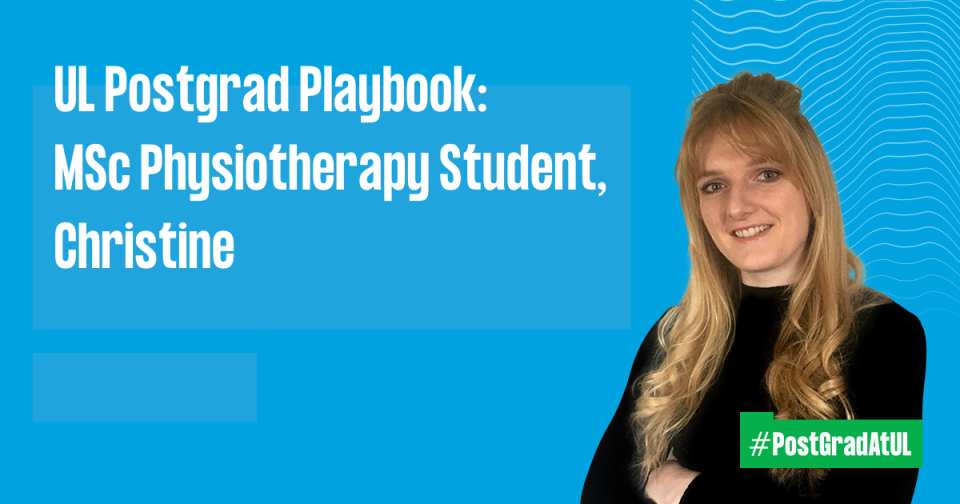
My name is Christine and I am in the 2nd year of the MSc Physiotherapy programme at the University of Limerick. I chose to undertake postgraduate study at UL as I had previously spent four enjoyable years there as an undergraduate student, and I was confident it was the best place to continue my studies. The location, campus and student life at UL drew me back in.
I wished to diversify into a new area and set my career on a different path which is why I chose this Physiotherapy Master’s course. I was eager to work in healthcare, and I am passionate about exercise and physical activity, so physiotherapy was the perfect choice. Another deciding factor was this course would enable me to gain a professional qualification as a chartered physiotherapist within two years.
What I’ve learned during my Masters in Physiotherapy
Throughout my studies, I’ve developed knowledge across many areas from the anatomy and physiology of the human body to the pathophysiology of conditions and injuries. I’ve learned about the role of a physiotherapist in health promotion and enhancing the quality of life for the person you’re treating.
Cardiorespiratory, neurological, and musculoskeletal systems, the mechanisms of pain, movement dysfunction, and the holistic nature of care and rehabilitation are areas I have really enjoyed learning about. This knowledge has been reinforced through various projects I’ve completed, focusing on conditions such as fibromyalgia, cancer, arthritis, congenital heart disease, chronic pain and post-partum care.
My postgrad has also given me the chance to develop many transferrable skills. My final year project is based on chronic pain and community-based exercise and this experience in particular has taught me to source, screen, extract and analyse data and to use new types of software.
Developing an appreciation of holistic care during my postgraduate work placement
Through developing reflective skills and clinical judgement, I have gained an appreciation of the holistic approach to the care needs of the client. These placements have also helped in developing my communication skills, as I communicate with clients, families, tutors, educators, and other healthcare professionals, and also my time-management skills and the ability to prioritise, as these are vital when managing my own placement case load.
There is an emphasis on clinical placement, with 1,000 hours to be completed. The Covid-19 pandemic made it difficult for healthcare students to access clinical settings for placements, however, our placement tutors ensured that we did. They really provided us with every opportunity to complete our required hours.
Preparing for work as a qualified physiotherapist
During my placements, I worked with physiotherapists and other healthcare professionals as part of a multidisciplinary team. This has helped me to prepare for work as a qualified physiotherapist in different environments and I’ve even had the opportunity to experience the emerging area of telehealth. With guidance from my tutor, I’ve worked on some brilliant projects such as Cardiac rehab, a ‘Get Up, Get Moving’ initiative and exercise classes for people with multiple sclerosis. I’ve also been fortunate to work with Dr. Kieran O’Sullivan, a world leading expert in back pain, on my final year project.
Supporting postgraduate students on their career journey
UL have supported me throughout this journey. All staff in the physiotherapy department go above and beyond to support students in any way they can. When Covid-19 struck last year, they ensured the transition to online learning was as smooth as possible for us. Student safety is always a priority in practical classes and placements. As this is an accelerated course, at times it can be intense, but with the small class size everyone knows each other really well and are always there to support each other.
I have grown both professionally and personally through my postgrad and developed transferrable skills that can be applied to many aspects of my life. Gaining an insight into both outpatient and inpatient settings in a hospital environment as well as working within telehealth, has grown my confidence. I have developed an improved ability to problem solve and lead, become a more reflective person and built many friendships during this course. If I decide to travel, this course has also opened many doors for me, as I will be eligible to work in many parts of the world.
Exploring my options after my physiotherapy masters
I came into this course with my sights set on sports physiotherapy and (to my surprise) I have become very interested in cardiorespiratory. The fast pace and team environment of hospital settings is something I really enjoy. I am passionate about care of the elderly and would love to go on to work in this type of a role. Over the next couple of years, I would like to rotate through different areas before eventually specialising in one.
What to expect from a Masters in Physiotherapy at UL?
Physiotherapy is a hugely fulfilling role, with no two days the same and a variety of areas to work in. I would say as a student physiotherapist, you build your foundation of knowledge, and when qualified, you will continue to build on this everyday as a lifelong learner.
If Christine’s experience sparks your interest, you can learn more about the MSc in Physiotherapy postgraduate course. Ensure to read more about what the Education and Health Sciences faculty can offer you during your postgraduate studies at UL. Download our guide to the faculty and discover what life at UL is like, the many hear from course leaders, other graduates and get more details on courses